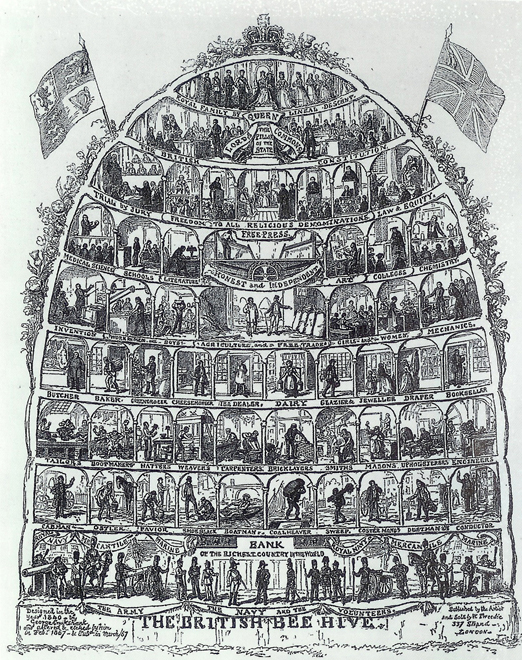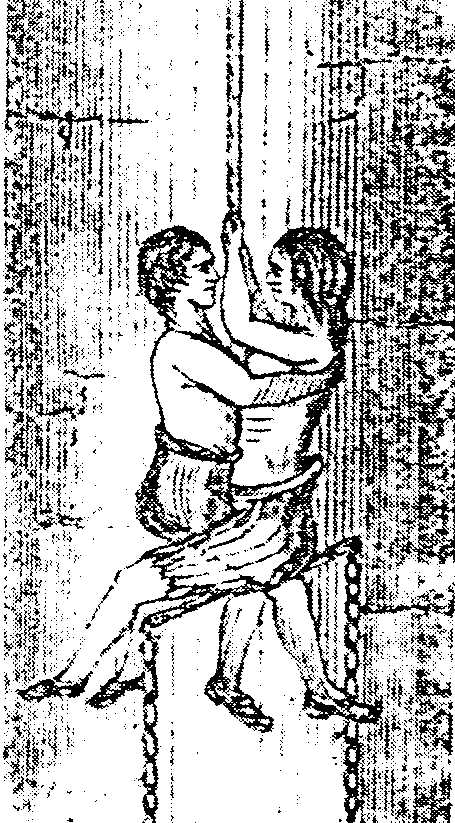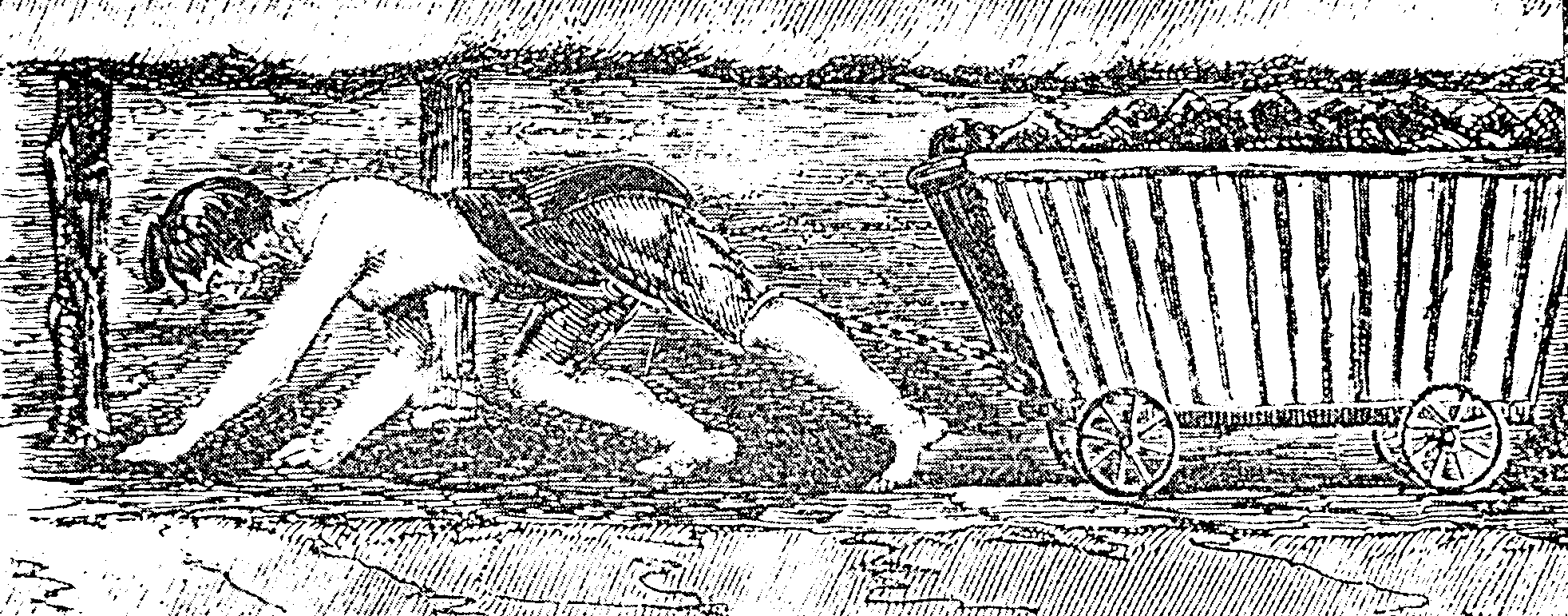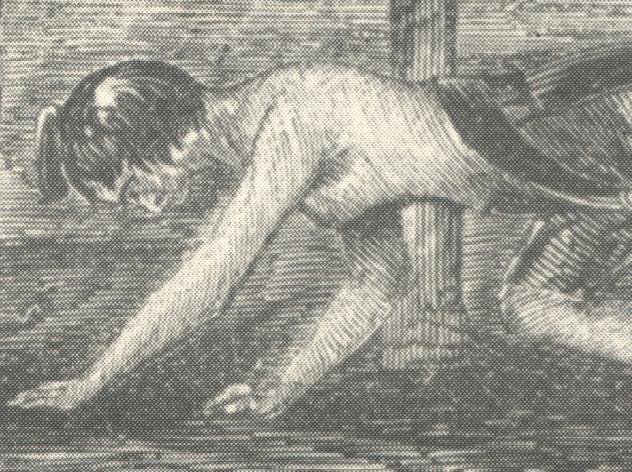Plug Riots
Summer 1842 coal mine owners lowered wages and factory
owners gave
notice that they intended to do the same. General strikes
under chartist
leadership broke out in the Midlands, Lancashire, Glasgow, and
South Wales.
The strikers immobilized machinery to stop blacklegging: in
Lancashire by
removing ...plugs..., so earning the strike its nick name, the
...plug
riots.... Weavers wrecked machines, farms and bakeries were
pillaged and
country houses set on fire. Wellington was put in charge of
the army,
troops sent to the disturbed areas and chartist
...ringleaders... arrested
and imprisoned. All together 1,500 arrests were made and the
trials lasted
until March 1843.
4.8.1842 A strike began in the neighbourhood of
Stalybridge in
resistance to a wage cut.
"'Another week' exclaimed a gentleman in Downing
Street on the
5th of August 1842, 'and we shall be prorogued. You can surely
keep the
country quiet for another week.'
'I cannot answer for the public peace for another
four-and-twenty hours',
replied his companion.
'This business at Manchester must be stopped at once; you have
a good force
there?'" (Benjamin Disreali's 1845 novel Sybil, or The Two
Nations,
Book 6, Chapter one.)
Chartist address to the Potters and Colliers, on strike, at Hanley, 15th
August, 1842 by Thomas Cooper, Methodist preacher (who went to prison for
reading his poem and inciting the riots). Verse one:
SLAVES, toil no more! Why delve, and moil, and pine,
to glut the tyrant-forgers of your chain?
Slaves, toil no more! Up, from the midnight mine,
Summon your swarthy thousands to the plain;
Beneath the bright sun marshalled, swell the strain
Of liberty; and, while the lordlings view
Your banded hosts, with stricken heart and brain,
Shout, as one man,-'Toil we no more renew,
Until the Many cease their slavery to the Few!'
"Toil we no more renew, Until the Many cease their slavery to the Few!"
means simply that the strike should go on until the then society collapsed
and was replaced by a democratic one. Democracy and workers rights and
women's rights all took energy from the
struggle against the real slavery of black people by white in the African
Slave Trade. See
the celebrations of 1833
9.8.1842 Plug Plot marchers descend on Manchester.
"Manchester
insurrection:"
"A million of hungry operative men [...] rose all up, came all
out into the
streets, and - stood there. What other could they do
[Carlyle]"
By the end August 1842, the stike had faded away, and
something over 1,500
had been arrested on various charges. About 800 were dealt
with by
magistrates in summary jurisdiction. 710 appeared before the
assizes in
York, Lancaster, Stafford, Chester and Liverpool. Feargus
O'Connor was not
tried until March 1843.
Jackson, T.A. 1945 p.135)
Germany: In October 1842, Karl Marx moved to Cologne, becoming
editor of the Rheinische Zeitung on 15.10.1842. In
November 1842,
Engels called at the editorial office of Rheinische
Zeitung and met
Marx, briefly, for the first time. Engels was on his way to
England.
November 1842 Friedrich Engels came from Germany to
Manchester to
work in a cotton factory (Ermen and Engels) owned by
his father. He
lived, worked and studied in Manchester until September 1844
"While I was in Manchester, it was tangibly brought home to
me that the
economic facts, which have so far played no role or only a
contemptible
one in the writing of history, are, at least in the modern
world, a
decisive historical force; that they form the basis of the
origination
of the present-day class antagonisms; that these class
antagonisms, in
the countries where they have become fully developed,
thanks to
large-scale industry, hence especially in England, are in
their turn the
basis of the formation of political parties and of party
struggles, and
thus of all political history" Engels, F 1885.
Thomas Carlyle (1795-1881) published Past and Present.
This
contrasted the human relations that, according to Carlyle, had
existed between people in the past, with relations in the present
which were reduced to money relations. He wrote (chapter 6)
"...the present Editor ... thinks that
'enlightened egoism' ... is not the rule by
which man's life can be led. That 'laissez-faire,' 'supply-and-
demand,'
'cash-payment for the sole nexus,' and so forth, were
not, are not, and will never be, a practicable law of union for a
society of men. That poor and rich, that governed and governing,
cannot long live together on any such law of union."
John Stuart Mill was, at this
time, a friend of
Carlyle. In Manchester, Friedrich Engels read Carlyle with
great
enthusiasm.
[See below]
21.1.1843 Edward Drummond, the private secretary of
the Prime
Minister (Robert Peel) was shot in Whitehall. He died. But it
was a
mistake. The assassin, Daniel McNaughton had intended to shoot
Peel.
28.2.1843 Ashley's spoke to Parliament about "the
diffusion of moral
and religious education among the working classes"
(education): Hansard
28.2.1843: "late events have, I fear, proved that the moral
condition of
our people is unhealthy and even perilous - all are pretty
nearly agreed
that
something further must be attempted for their welfare; ...-our
duty is to
examine the moral state of the country; to say whether it be
safe,
honourable, happy, and becoming the dignity of a Christian
kingdom; and, if
it be not so, to address ourselves to the cure... The present
time...finds
us
in a state of mind equally distant...from the...opinion...
that education
is
the...immediate... panacea for all our disorders [and] the
other that it
will
either do nothing at all, or even exasperate the mischief.
That it will do
everything is absurd; that it will do nothing is more
so;...every true
statesman, of every age and nation has considered a moral,
steady, obedient
and united people indispensable to external greatness or
internal peace."
"our lot is cast in a time when our numbers, already vast, are
hourly
increasing at an almost geometrical ratio...our institutions
receive, every
day, a more liberal complexion, while the democratic
principle, by the mere
force of circumstances is fostered and developed..." "if we
look forward to
the next ten years, there will be an increase of at least
2,500,000 in the
population; and should nothing be done to supply our want, we
shall then
have in addition to our present arrears, a fearful multitude
of untutored
savages."
October and November 1843 Engels wrote Outline of a
Critique of
Political Economy. This was a socialist criticism of
English political
economy.
The Claims of Labour. An Essay on the Duties of the
Employers to the Employed, published anonymously, argued
for a new
order of society based on benevolence of employers towards the
employed.
The argument was very similar to Lord Ashley's.
January 1844 Engels wrote a favourable review of
Carlyle's Past
and Present.
February 1844 Karl Marx published Engels' Critique
of Political
Economy and his review of Carlyle's Past and
Present in a (one
issue) journal that he published in Paris. By the early months
of 1844
Engels was working on a book about
the conditions of the
English working
class.
28.8.1844 to 6.9.1844: Engels, returning to Germany
from England,
called on Marx in Paris and spent 10 days with him. From this
time they
became close collaborators.
19.11.1844: Letter from Engels (in Barmen) to Marx (in
Paris) "I am
buried up to my neck in English newspapers and books from
which I am
compiling my book on the condition of the English
proletarians. I expect to
be done by the middle or end of January, as I finished the
most difficult
job, the arrangement of the material, about one or two weeks
ago"
John Stuart Mill's review of The Claims of Labour in
the
Edinburgh Review argued that a new moral order based on
benevolence
would undermine the independence and self-determination of
working class
people
Summer 1845 Engels:
The Condition of
the Working
Class in
England. In one of, several, references to
Carlyle, he wrote
"the bourgeois reason ... cannot comprehend that he holds any other
relation to the operatives than that of purchase and sale... Even the
relation between himself and his wife is, in ninety-nine cases out
of a hundred, mere "cash payment". Money determines the worth of the
man..."
Autumn 1845: John Stuart Mill began writing his Principles
of Political
Economy. J.S. Mill said that most of his writings, after
1840, were
"joint productions" with Mrs Harriet Taylor.
October 1845 Beginning of the Great Famine in Ireland.
Potato blight
destroyed three-quarters of the crop.
Beginning of 1846: Marx and Engels, in Brussels, formed a Communist
Correspondence Committee - that is a (very small) network of theorists
in different countries who would write to one another about politics. This
played a part in the activities of the (also very small) Communist
League that commissioned Marx to write its
"Communist Manifesto" [See
below]
26.6.1846 Repeal of the
English Corn Law. These had
kept the price
of bread artificially high, to protect English farmers. The
Corn Law had
been supported by Tories and landowners and opposed by liberal
political
economists ("free traders") and industrialists. - See
Anti-Corn Law League
Winter 1846/1847: J.S.Mill laid aside his work on the
Principles
of Political Economy to campaign for land reform in
Ireland.
June 1847 10 Hours Act passed restricting women and
young
persons to 63 hours a week.
Early June 1847: The first "congress" of the small "League" Marx
associated with held in London. Unable to travel to London, Marx was
represented by Engels and W. Wolff. The congress decided to reorganize the
"League of the Just" and become the "League of Communists". It also
decided to prepare a "Communist Creed" for the next congress.
23/24.11.1847 Letter from Engels (in Paris) to Marx (in
Brussels)
speaks about his (Engels) draft of the "Communist Manifesto".
(Principles of
Communism)
29.11.1847 to 8.12.1847: Second Congress of the
Communist
League held in London with Marx and Engels in attendance.
Although
attempting to be international, this was mainly a group of
German speaking
people who did not find it safe to live in Germany given their
politics.
Marx was one of these exiles. The English (Chartist) paper,
the Northern
Star, published the following account of a speech he made
at the
Congress:
"Dr Marx, the delegate from Brussels, then came forward, and
was greeted
with every demonstration of welcome, and delivered an
energetic oration in
the German language." In this he called on the Democrats of
Britain to help
to establish "a congress of working men to establish liberty
all over the
world". He said that the Democrats of Belgium, whom he
represented, felt
that the Chartists of England were the real Democrats and that
the moment
they carried the six points of their Charter, the real road to
liberty
would be opened to the whole world. "Effect this grand object,
then, you
working men of England and you will be hailed as the saviour
of the whole
human race", said the speaker.
Principles of Political Economy - With Some of Their
Applications to
Social Philosophy, by
John Stuart
Mill,
published. This included an essay, first drafted by
Harriet
Taylor,
called On the
Probable Futurity
of the Labouring Classes.
24.1.1848 Resolution of Central Committee of the
Communist
League, sent to Brussels, for Marx, on 26.1.1848:
"The Central Committee hereby directs the District Committee
of Brussels to
notify Citizen Marx that if the Manifesto of the Communist
party, which he
consented, at the last Congress, to draw up, does not reach
London before
Tuesday, February 1, further measures will be taken against
him. In case
Citizen Marx does not write the Manifesto, the Central
Committee requests
the immediate return of the documents which were turned over
to him by the
congress. In the name and at the instruction of the Central
Committee,
(Signed) Schapper, Bauer, Moll"
February 1848 Révolution de Février: February
revolution in France
Late February 1848:
The Manifesto of
the Communist
Party , written by Karl Marx and Friedrich Engels,
published in German, in London. The first
English translation
of The Communist
Manifesto was made by a Miss Helen Macfarlane and pubished
in
1850 in a Chartist periodical called Red Republican,
edited by
George Julian Harney
23.6.1848 to 26.6.1848 Les journées de Juin: The June
Days Uprising staged by the workers of France in response to plans to close
the National Workshops.
20.12.1848 Election of Louis Napoleon as President of France
announced.
"Enfranchisement of Women", by Harriet Taylor, published in
The Westminster Review l851 (See Taylor, H. 1851).
Harriet Taylor
married J.S. Mill in April 1851. She died in 1858. J.S. Mill's
The
Subjection of Women was published in 1869.
1.12.1851/2.12.1851 Coup d'etat of Louis Napoleon.
2.12.1852 Second French Empire
1859 Molestation of Workmen Act allowed peaceful picketing which was
not to count as molestation under the
1825 Combination Act.
The Reform Union formed. It had a broader base than the
Reform
League, but similar aims.
28.9.1864 First International Working Men's
Association
established by Marx in London. (Dissolved 1876)
6.7.1865 Parliament dissolved: July 1865 General
Election. J.S.Mill
elected for Westminster. MP for Westminster 1865 to 1868.
October 1865 Death of Palmerston. Earl Russell Prime
Minister.
October 1865 Manchester National Society for Women's
Suffrage
formed.
Honorary secretary, Elizabeth Wolstenhome, afterwards Mrs
Elizabeth
Wolstenhome Elmy. This was the first society formed in Britain
to secure
the vote for women.
The London Working Men's Association was formed in 1866
to press for
working class MPs.
Hornby v. Close case. Trade Unions found that the 1855
Friendly Societies
Act did not protect their funds. The judges ruled that trades
unions were
outside its scope because they were still "illegal", although
not
"criminal", organisations. (See 1871)
27.4.1866 In debate on the Liberal Reform Bill,
Disraeli said: I
have always been of the opinion that, if there is to be
universal suffrage,
women have as much right to vote as men; and, more than that,
a woman
having property ought now to have a vote, in a country in
which she may
hold manorial courts, and sometimes acts as churchwarden.
(Pankhurst,
S.1931 p.33)
Following Disraeli's speech, Emily Davies and others drafted a
petition
that since Parliament had made the holding of property the
basis of
enfranchisement, women property holders should be entitled to
vote. They
secured J.S.Mill's approval, collected 1,499 signatures for
it, and Mill
presented it to parliament.
(Pankhurst,
S.1931 p.33-34)
June 1866 Whig Government resigned over inability to carry
franchise
reform. Earl of Derby Prime Minister of a Conservative
minority government.
February 1867 Parliament reassembled. Queen opened
Parliament for
first time after her long seclusion. Speech included attention
being paid
to the representation of the country.
11.2.1867 Disraeli made a speech saying he sought to
lift reform
above party politics.
25.2.1867 Disraeli suggested preliminary resolutions
that would have
increased representation of the labouring classes, but brought
in checks
and balances. Badly received. Withdrawal of the resolutions
led to anti-
democrat Ministers resigning from the cabinet.
18.3.1867 Disraeli brought in a Reform Bill with more
liberal
features than his resolutions.
During the Easter recess reform meetings were held throughout
the country
House of Commons reconvened at beginning of May.
6.5.1867 Reform League public meeting in Hyde Park.
Followed by Home
Secretary Walpole's resignation. Hyde Park Railings
Incident: The
Government tried to prevent the Reform League demonstrating in
Hyde Park,
but the railings broke under the weight of demonstrators, who
held their
demonstration in Hyde Park after all.
20.5.1867 J.S.Mill's House of Commons speeches on: "The
Admission of
Women to the Electoral Franchise" and on representation for
minorities.
15.7.1867 Reform Bill's third reading in the House of
Common
15.8.1867 Reform Bill paused its final stage. The
1867 Representatives of the People Act
26.11.1867 In election for the City of Manchester, Lily
Maxwell, a
shopkeeper whose name was on the Parliamentary Register,
successfully
recorded her vote for Jacob Bright.
(Pankhurst,
S.1931 p.38)
Ashley's
speeches
published
Trades Union Congress founded
February 1868 Benjamin Disraeli Prime Minister in a
Conservative
minority government.
Spring 1868: Letters sent by Manchester Suffrage
Committee to all
Boards of Overseers, requesting them to put every qualified
person on the
list of voters, whether male or female.
November 1868:
Liberal General Election landslide: But J.S.Mill defeated in
Westminster by
W.H.Smith.
December 1868 W.E. Gladstone Liberal Prime Minister.
Matthew Arnold's Culture and Anarchy described the working
class (populace)
as either wanting to become like the middle class or merely
degraded and
brutal.
Girton College, Cambridge, admitted women
The Labour Representation League (1869 to 1880) sought to get
working class
MPs elected and put pressure on other MPs to support working
class issues.
"In early by-elections, the League's object was to secure the
adoption of
its candidates by the Liberal Party. Many Liberals, including
John Stuart
Mill, had expressed the desire to see working men in
Parliament to put the
working class point of view, and the League's ambitions did
not go beyond
this" (COLE,G.D.H.1926 p.113)
J.S.Mill's The Subjection of Women published. (Written in
1861)
Susan Brownell Anthony became one of the leaders of the
National Woman
Suffrage Association in the USA.
7.11.1869 Case in the Court of Common Pleas for
accepting registered
women in Manchester and Salford lost
(Pankhurst,
S.1931 pp 43-45)
1870 to 1871 Franco-Prussian war
1870 Married Woman's Property Act
Forster's 1870 Elementary Education Act passed
18.3.1871 to 28.5.1871 Paris Commune
9.5.1871 to 13.5.1871: Marx repeatedly met a delegate of the Commune and
sent instruction through him on 13.5.1871.
Late May 1871: Marx completed his address on the Commune -
The Civil War in France -- and on 30.5.1871 read it to
the General Council; the address was adopted without discussion. At Engels'
proposal, it was resolved to have it printed in 1,000 copies.
28.6.1871 - 29.7.1871: The address on the Commune, The Civil War In
France, is published in Volksstaat, in Engels' German translation.
17.9.1871 to 22.9.1871: Conference of the International Workers'
Association in London, with Marx playing a prominent part and moving all
the resolutions of the General Council.
1871 Trade Union Legislation:
1871 Trades Union Act gave unions legal recognition and
enabled them to
protect their funds under the 1855 Friendly Societies Act.
1871 Criminal Law Amendment Act made picketing illegal again
(see 1859)
Jacob Bright again introduced the Women's Suffrage Bill
(Pankhurst,
S.1931 p.47)
Monday? 19.8.1871 first statute Bank Holiday
In the 1874 election, the Labour Representation League gave
support to
candidates most favourable to the labour interest (whether
Conservative or
Liberal). 15 working class candidates stood in the election.
TUC opposition to the Liberal government's 1871 Criminal Law
Amendment Act
was partly responsivle for the return of Disreali's second
administration.
February 1874 Conservative Election victory. Benjamin
Disraeli Prime
Minister. Two of the 15 working class candidates (supported by
the Labour
Representation League) were elected. Both were miners and both
had Liberal
support.
As Jacob Bright lost his seat at the February 1874 election,
the Women's
Suffrage Bill was taken up by a Conservative member, W.
Forsyth QC, MP, who
added a clause excluding married women from the vote.
(Pankhurst,
S.1931 p.49)
Repeal of the 1871 Criminal Law Amendment Act
1875 Conspiracy and Protection of Property Act made peaceful
picketing
legal and changed the law so that `conspiracy` could not be
applied to
trade disputes unless the actions themselves were illegal.
1875 Employers and Workmen Act limited the penalty for breach
of contract
to payment of civil damages.
COLE,G.D.H.1926 p.115 suggests that the "true 'Lib-Lab' era"
began in 1875
as leaders of the trade union movement and the Liberal Party
moved closer
together.
Democratic Federation founded (At this time, a radical, not a
socialist,
political group.
H.M. Hyndman's England for All published.
William Morris, wealthy society artist, joined the Democratic
Federation.
He lectured in Manchester on Art, Wealth and Riches and
in Oxford on
Art and Democracy. At about this time, he was reading
Marx's
Capital in French.
1884 Representatives of the People Act
Fabian Society founded
The Democratic Federation renamed the Social
Democratic
Federation. This was socialist. William Morris was a
member of its
executive. He contributed frquently to its new journal
Justice,
which he helped to fund and sold on the streets. He formed a
Hammersnith
Branch.
December 1884 Morris resigned from the Social
Democratic
Federation and helped to found the Socialist League
William Morris edited and contributed to Commonwealth,
a new journal
for the Socialist League. During the year, some
socialists were
arrested after an open-air meeting. There were disturbances
when they were
brought before the police court. Morris was arrested during
the
disturbances, but discharged.

|
1886
|
|
1886 Custody of Infants Act
(Pankhurst,
S.1931 p.31)
Year of the Royal Bedroom and the Pall Mall Windows:
There were
eleven working class MPs (all Liberal) and one of them (Henry
Broadhurst)
was made an Under-Secretary of State by the Prime Minister
(Gladstone). He
stayed at Buckingham Palace, where his bedroom fire was poked
by the Prince
of Wales. In the same year a procession of the unemployed was
jeered at in
Pall Mall, and smashed windows in response.
February 1886 W.E. Gladstone Prime Minister.
Irish Home Rule Bill led to the defection of the Liberal
unionists. Bill
defeated.
August 1886 Marquis of Salisbury Prime Minister.
(Conservative with
Liberal Unionist support)

|
1887
|
|
Marx's Capital volume one published in English.
13.11.1887 "Bloody Sunday" Alfred Linnell died (on
20.11.1887)
from injuries received when police tried to prevent a
demonstration
of the unemployed storming Trafalger Square. He was labelled
the
"First English Socialist Martyr". William Morris was one of
the pall-
bearers and speakers at his funeral.
(see Morris How the
Change
Came)

|
1888
|
|
Susan Brownell Anthony organised the International Council of
Women
Matchgirls' strike
7.1.1888 Robert George Gamage died

|
1889
|
|
London Dock Strike
Fabian Essays published. Essays by Bernard Shaw, Sidney
Webb, Graham
Wallas, Sidney Oliver, William Clarke, Annie Besant and
Herbert Bland.
First volume of Charles Booth's Life and Labour of the
People of
London published. Charles Booth (1840-1916), a
statistician, began this
work in 1885 with the intention of refuting Social
Democratic
Federation propaganda. Eventually, the work had seventeen
volumes, and
was completed in 1902.
Second International founded in Paris.

|
1890
|
|
William Morris began to publish
News from
Nowhere as instalments is Commonweal.
During the
year, he was ejected as the editor of Commonweal, but
continued the
instalments of News from Nowhere. Morris left the
Socialist
League and the Hammersmith Branch was renamed the
Hammersmith
Socialist Society

|
1891
|
|
Free elementary education
The right of a husband to use force against his wife was first
denied by
the courts in 1891.
William Morris (1834-1869) published
News from
Nowhere as a book.

|
1931
|
|
Sylvia Pankhurst (1882-1960) The Suffragette Movement
(Re-published
by Virago in 1977)
© Andrew Roberts 27.2.2001
-
Citation suggestion
Referencing
My referencing suggestion for this page is a bibliography
entry:
"Roberts, A. 27.2.2001 - What About the Workers?
<http://www.mdx.ac.uk/www/study/ssh1840s.htm>
With intext references to "(Roberts, A. 27.2.2001 - date)",
where the
"date"
is the 18-- date of the entry.
See ABC
Referencing for general advice.
Until 29.10.2003, this page was called Chronology of the
1830s and
1840s
 Study
Link Study
Link
 Andrew Roberts' web Study Guide Andrew Roberts' web Study Guide
 Top
of
Page Top
of
Page
 Take a Break - Read a Poem
Take a Break - Read a Poem
 Click coloured words to go where
you
want Click coloured words to go where
you
want
Andrew Roberts likes to hear from users:
To contact
him, please
use the Communication
Form
| 









 Click coloured words to go where
you
want
Click coloured words to go where
you
want